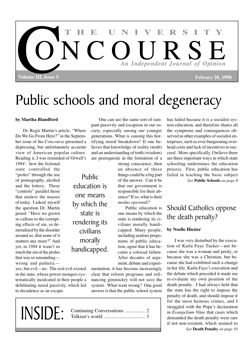Different degrees of authority
by Kathleen van Schaijik
A friend sent me the following remarks on last issue’s editorial. I asked for and received his permission to publish them anonymously. KvS.
You wrote a nice piece in support of Ziegler’s very interesting article, but I was a little puzzled by the way you led with infallibility. The document certainly doesn’t come close to an exercise of infallibility. I would think in fact that a Catholic who complied with the guidelines on giving communion and who affirmed the dignity of the ordained minister and the tasks proper to the layman, would be within his rights to think the guidelines unfortunate and to work through the appropriate channels to have them reversed. I personally am glad of the directives of this document, but I can think of plenty of post-Conciliar curial legislation on the liturgy—for example, the Vatican suppression of the Mass of Pius V, or the approval of the barbarous ICEL translations—that I can’t help regarding as unfortunate and where I console myself with the thought that the causa is not finita. In other words, much as we want to welcome this new document, we don’t, I would think, want to welcome in such a way that our hands and consciences are tied when a less satisfactory document comes around.
the editor replies:
My thanks for the chance to correct a misleading editorial. I had not meant to imply that this new document is on a level with an ex-cathedra exercise of papal infallibility. My intention was to reflect not so much on infallibility proper as on the world—confounding happiness and freedom that flow from the authority of the Church exercised in all its dimensions. From this point of view, even a document that we may legitimately consider unfortunate and work to see reversed can be accepted with joy—perhaps as a discipline or a mortification; an opportunity to express our humble, filial obedience to an imperfect Mother, and to show our absolute confidence in God’s ultimate protection of the Church, in spite of her fallen aspect. But, I expressed myself badly.
Now that the point has been clarified, however, I am wondering just what kind of authority this document does have. My impression from reading Mr. Ziegler’s article was that it was something more than a routine curial instruction. It seemed to me to have an air of finality to it—as if the Church has been observing the efforts of the faithful and deliberating over the question for some time, and is now ready to pronounce definitively that certain practices (including some that have been normal at FUS) are not fully consistent with the mysteries at hand.
But I am certainly no expert on these things. Is there a theologian in the house who might be willing to help us out ?


